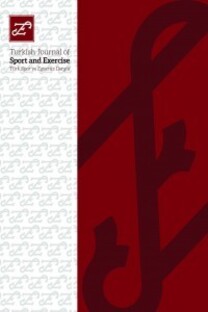Examination of the effects of globalization over physical education and sports academies (sample of Ankara)
Globalization; physical education and sports academies; administration; finance; technology; research; learning/teaching dimension
-
Globalization, physical education and sports academies, administration, finance, technology, research learning/teaching dimension,
___
- Arıboğan DÜ. Küreselleşme Senaryosunun Aktörleri. İstanbul: Derin Yayınları, 1996.
- Arslanoğlu RA. Küreselleşme ve Üniversite. Uludağ Journal of Economy and Society, 2002; 21(1): 142.
- Ateş D. Globalization: to What Extent is it One- Dimensional? Doğuş University Journal, 2006; 7(1): 25-38.
- Bolay SH. Siyasi, Ekonomik ve Kültürel Boyutlarıyla Küreselleşme. Küreselleşme ve Milli Kültürler. Istanbul: Ufuk Kitapları 27, Sosyal Bil. Dizisi 3, 2002.
- Freeman A, Kagarlitsky B. Küreselleşmenin Krizi. Çev.: İbrahim Yıldız, Bahar Kara. Yordam Kitap Bas. Yay. 2004: 23-26.
- Giddens A. Sosyoloji. Ankara: Ayraç Yayınları, 2000.
- Güzelcik E. Küreselleşme ve İşletmelerde Değişen Kurum İmajı. İstanbul: Sistem Yayınları, 1999.
- Holton R. Globalization's cultural consequences, dimensions of globalization. Annals of the American Academy of Political and Social Science, 2000; (570): 140-152.
- Jameson F. Küreselleşme ve Politik Strateji. Birikim, 2000; (139): 39–50.
- Kale N. Modernizmden post-modernist söylemlere doğru. Doğu Batı Düşünce Dergisi, 2002; 5(19): 29–46.
- Kwiek M. Yüksek Öğretimi Yeniden Düşünürken Yeni Bir Paradigma Olarak Küreselleşme: Gelecek İçin Göstergeler. Çev. Akbaş E., Kuram ve Uygulamada Eğitim Bilimleri, İstanbul: EDAM Yayınları, 2002, 2(1): 133-154
- Magdoff H. The Age of Imperialism, The Economics of U.S. Foreign Poicy. Emperyalizm Çağı, A.B.D.’nin Dış Politikasının Ekonomik Temelleri. Çev.: Doğan Şafak, Odak Yayınevi, Ankara. 1974.
- Manisalı E. Türkiye ve Küreselleşme, İstanbul: Derin Yayınevi, 2002.
- Narlı Ö. Küreselleşme – mesih mi şeytan mı? Bursa Tabip Odası Yayın Organı. Bursa: Hekimce Bakış, 2002 (53): 25
- Newman C. Realizm: Küreselleşme ve Bağımsız Devlet. Çev: Muammer Türker, Türkiye Günlüğü, 2001 (64): 79–88.
- Oran B. Küreselleşme ve Azınlıklar. Ankara: İmaj Yayınevi, 2000.
- Robertson R. Küreselleşme. Çev. Ümit Yasal, Ankara: Bilim Yay., 1999.
- Saage R. Postmodernlik ve Aydınlanma. Çev.: Ahmet Arslan, Yeni Forum, 1993; 14(287): 51–55.
- SönmezV. Küreselleşmenin felsefi temelleri. Eğitim Araştırmaları, 2002; (6): 2-11.
- Şaylan G. Küreselleşmenin Gelişimi – Küreselleşme. Ankara: İmge Kitabevi, 1997.
- Senturk IK. The Effected of Globalization over Educational Faculties. Hacettepe Univerity Doctoral Thesis, Ankara, 2007.
- Toprak M. Küreselleşme ve Kriz Türkiye ve Dünya Deneyimi. Ankara: Siyasal Kitabevi, 2001.
- Tutar, H. Küreselleşme Sürecinde İşletme Yönetimi. İstanbul: Hayat Yayıncılık, 2000.
- Yılmaz A. Modernden Postmoderne Siyasal Arayışlar. Ankara: Vadi Yayınları, 1996.
- Yayın Aralığı: 3
- Başlangıç: 1999
- Yayıncı: Selçuk Üniversitesi, Spor Bilimleri Fakültesi
Khaled Thabet AWAD, Ahmed Ibrahim EID
Fatih BEKTAS, Gamze BEYAZOGLU, Idris YILMAZ
A comparison between Aba Wrestling and Judo within technical aspect
Ozge CAGLAR, A. ULUDAG, Tulin SEPETCI, Erkan CALISKAN
Physical education candidate teachers' beliefs about vocational self-esteem
Murat OZSAKER, A. Meliha CANPOLAT
Ezgi ERTUZUN, Bülent FISEKCIOGLU
Physical education candidate teachers' beliefs about vocational self-esteem
The effects of detraining period on female basketball team players aged 10-12
